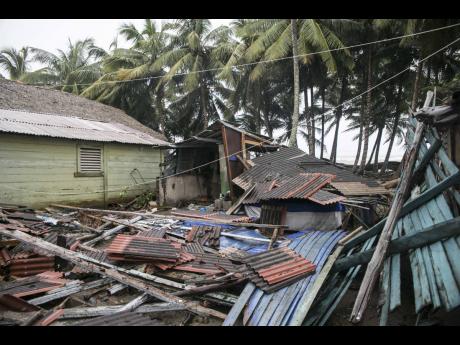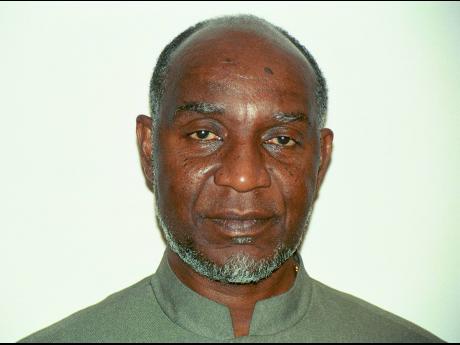Byron Blake | Climate financing for SIDS: 15-years late
I was simultaneously intrigued and deeply distressed reading Baroness Scotland’s article “Small Island Developing States Need Finance to Tackle Climate Crisis” in The Sunday Gleaner of June 23, and Dr Dennis Minott’s very positive comments thereon. Intrigued, because it correctly identifies the huge and increasing need of the small island developing states (SIDS) for financial resources for adaptation to, and mitigation of, an existential problem they did not create.
Distressed, deeply distressed, because this case is 15 years late. December 2009, at COP 15 in Copenhagen was the last time the provision, not the promise, of meaningful international financial support coupled with a determination to hold increases in ambient temperatures to below 1.5 degrees Celsius post-industrialisation could have averted the development catastrophe SIDS now face.
Unfortunately for the SIDS, those were not the decisions that emerged from Copenhagen. Instead, the Copenhagen Conference released the long-agreed 1.5 Degrees C cap. The decision shifted to “below 2.0 Degrees C” with a promise of US$100 billion to developing countries. To appreciate what that 0.5 meant we turn to the United Nations secretary-general who, in his June 5 Environment Day message advanced that “the difference between 1.5 and two degrees could be the difference between extinction and survival for some small island states and coastal communities.”
I was deeply distressed because the acquiescence of the SIDS in Copenhagen was due in large measure to pressure from two large Commonwealth countries. A few weeks before the Copenhagen COP, Prime Minister Gordon Brown of the United Kingdom appeared with President Nicolas Sarkozy of France at a CARICOM Leaders Meeting in Grenada. Grenada, on behalf of the Caribbean, was at the time chair of the Alliance of Small Island States (AOSIS) and therefore the coordinator of the SIDS in climate negotiations. Those two powerful European leaders extracted a silent commitment from Caribbean leaders not to insist on the 1.5 Degrees ceiling at the meeting in Copenhagen. Further, I understood at the time that Australia, another Commonwealth member, exerted similar pressure on the Pacific SIDS.
OBSERVED CORRECTLY
Fifteen years after Copenhagen, the Commonwealth secretary-general has observed correctly that the 1.5 degrees Celsius has been beached in 2023-24, and the SIDS had received only $1.5 billion of the $100 billion promised to developing countries.
Fifteen years later we might add:
• The UN secretary-general’s observation in the above-referenced statement that “there’s a 50-50 chance that the average temperature for the entire next five-year period will be 1.5 degrees higher than pre-industrial times.
• The scientific logic that with such consistently high heat levels global ambient temperatures will exceed the 2.0 degrees Celsius set at Copenhagen within the decade.
• As at 2023 the US$100-billion promised in Copenhagen had not been achieved.
• The industrialised countries have not been spared the ravages of nature’s response to our assault on the climate, and will soon claim that their climate-related damages will require them to direct all resources to the needs of their voting communities.
The environment for international negotiations has changed radically for SIDS with the realities of (a) the breach of the 1.5 Degrees ceiling, and (b) the failure of COP 28 to agree on the rapid phasing out of fossil fuels. Their focus in climate-related international and other conferences must also change. SIDS focus must now be on decisions, strategies, and actions to reverse the trend and pull back the increase in average ambient temperatures to below 1.5 Degrees C in the shortest possible time. To do otherwise would be like a man in the middle of a lake with a millstone that has been strapped around his waist, negotiating cooperatively with those who strapped the millstone for an aspirin because he also has a headache. The single objective must be the removal of the millstone. To do otherwise would make him complicit in his own demise. Put differently he would allow his murder to be justified as suicide.
GREATER CONCESSIONS
So, as well-intentioned as the Commonwealth secretary is in calling for upcoming conferences to focus on the financial needs of SIDS. And, as Barbados Prime Minister Mia Mottley was in Egypt in 2022 when she rallied leaders of low- and middle-income countries to demand greater concessions from the wealthy North to help them, and SIDS in particular, confront the existential threat of global warming, circumstances have overtaken their efforts. Finance remains important, but is no longer the vital interest.
SIDS leaders, together with their supporters, sympathisers, and NGOs, must sound the death bell, be resolute, and demand rapid reduction in greenhouse gas emissions. Timelines like 2035, 2040 and 2050 can no longer be accepted.
Where does that leave the issue of the financial needs of SIDS?
As stated earlier the financial needs of SIDS will increase exponentially. In an article published in The Gleaner, on Sunday, January 14, I argued that with the failure of COP 28, “AOSIS members must now depend on themselves, strategising and working cooperatively”. The SIDS at the 4th International Conference on Small Island States (SIDS4), in Antigua and Barbuda in May 2024, made an important move into that direction by initiating the Development Bank for Resilient Prosperity (DBRP). The DBRP aims to address the persistent financial challenges faced by SIDS. According to the proponents it would be financed by developing countries utilizing their rich natural resources as assets. These resources, they assert, could include aspects of the green economy (forests, parks, renewable energy resources), blue economy (oceanic resources, fisheries, marine ecosystems), carbon economy (carbon credits, emissions trading systems), and biodiversity (diverse ecosystems and species). Also, rights and assets related to the seabed, such as mineral deposits or energy resources. By leveraging the inherent value of these renewable assets, the DBRP would enable SIDS to tap into new and sustainable funding sources that are aligned with the goals of sustainable development and environmental conservation.
This approach leading to financial independence and the new approach to climate negotiations would be the game-changers that have eluded SIDS over the last 30 plus years.
Byron Blake is former Jamaica deputy permanent representative to the United Nations and former assistant secretary general of the Caribbean Community. Send feedback to ambassadorblake@gmail.com and columns@gleanerjm.com


